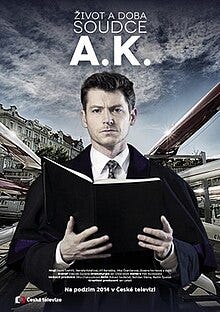The Czech TV serial “Life and Times of Judge A.K.”
Or The completion of Czech society's Westernization?
I was alerted about this serial by a reader's comment to my last article in Britské listy on Judge Fremr and I couldn't be more grateful. I have enjoyed it for several reasons.
First, it is a really good show: the actors are good, and the plots are interesting and entertaining. I wouldn’t go so far as to say that this was the best serial ever, but it has kept me pleasantly busy for many evenings. I especially liked the cynical inner thoughts of the judge.
Second, being myself involved in a small lawsuit and writing on justice, I was very interested in the everyday life and work of a judge as it is depicted in the serial. There it exceeded my expectations: because of the way the serial is constructed, the viewer sees in the first season that justice is very fragmentary, the information the judge gets is never sufficient, everything happens much too quickly, and a human destiny gets dramatically altered over a couple of minutes and fleeting impressions – which is rather sad. We never really know for sure if justice was served or not because we never have all the pieces of the puzzle – as it doubtless is in real life. The suicide of a mother whose young child was taken away by the judge to be given to the richer father is a case in point. And in the second season, the serial changes tack and shows us the criminal act as it happens before we follow how the judge is confronted with the case. So now the viewer sees from a different angle that almost everyone is permanently lying and it is not only difficult to tell truth from lies, but it is in many instances impossible for authorities to do anything against lies and false testimonies, even when they are detected.
Third, we see quite clearly that justice is really difficult to attain and in many (most?) instances, there isn't any to be had. I was also troubled to see that sometimes the judge knew who was morally right and wrong, but still had to rule in favor of the party who was morally wrong. This was rather disturbing. It was also clear that the first instance judgement is meaningless as all parties are counting on the appeal as the “true” judgement.
Fourth, the rendition of the Fremr case, or rather something that very much looked like the Fremr case as I don't think the authors actually knew about the real Fremr at the time when they wrote the script of the serial, permeates both seasons and was very interesting indeed. Judge Fremr was very nearly appointed to the Czech Constitutional Court in summer 2023 before an unsavory element about his past resurfaced: he had sentenced away three young men in a case which was evidently constructed by the secret police. Under pressure, Fremr finally stepped down as a candidate, just like Adam Klos’ father steps down as an already appointed constitutional judge when a comparable revelation happens in the serial. The family conversations between a lawyer mother, a Constitutional Court judge father, and a first instance civil judge son are incidentally quite amusing. It makes justice appears as what it mainly is, i.e. a professional/technical, rather than a moral, issue.
Fifth, I was of course delighted that the notions of right and wrong rapidly became very blurred. This is not a serial for moral purity, which sounded very authentic. It was also quite ironic to see judges, lawyers, and policemen suddenly panicking about being convicted for their own actions. The law became a very relative measurement of human behavior. And the proposal of the serial to draw a parallel between the moral compromission of this generic, communist “Fremr” and the moral compromission of any judge today gives food for thought. “It’s not the same”, says the mother. “It is”, says the judge before resigning from his position.
Sixth and last, apart from this communist judge case that is specific to a post-communist country, it is, I believe, the first time that I see a Czech serial that could really entirely take place in France or anywhere else in the west. I don't know how the Czech public appraised the show and if they appropriated it as being fully Czech, but all the stories appeared to me interchangeable with any other country. The references to Western culture, from its very title reminding John Huston’s Western The Life and Times of Judge Roy Bean to a case strongly reminding of Oscar Pistorius, are obvious. Incidentally, thirty years ago, I would have thought the level of corruption of authorities shown here was over the top if it was to describe France, but sadly not any more.
In this sense, this serial symbolizes how the former east and the west are finally merging to describe the same kind of society, what Jan Čulík was also reflecting upon recently. For a long time, I wished nothing else for post-communist countries and the west but to be “the same”, but now I'm paradoxically not sure to be so happy about it after all. Will it not be a bit boring if we only have the same stories to tell? And the proverbial Czech humor disappeared here. We are now far away from a film like Miloš Forman’s The Firemen's Ball, which truly could not have taken place in France.
Despite its small flaws, I am surprised the serial didn't make a career on Western platforms, I could totally imagine to see it on Netflix or elsewhere. But apparently it stopped at the level of Czech TV. Lucky Czech viewers!






